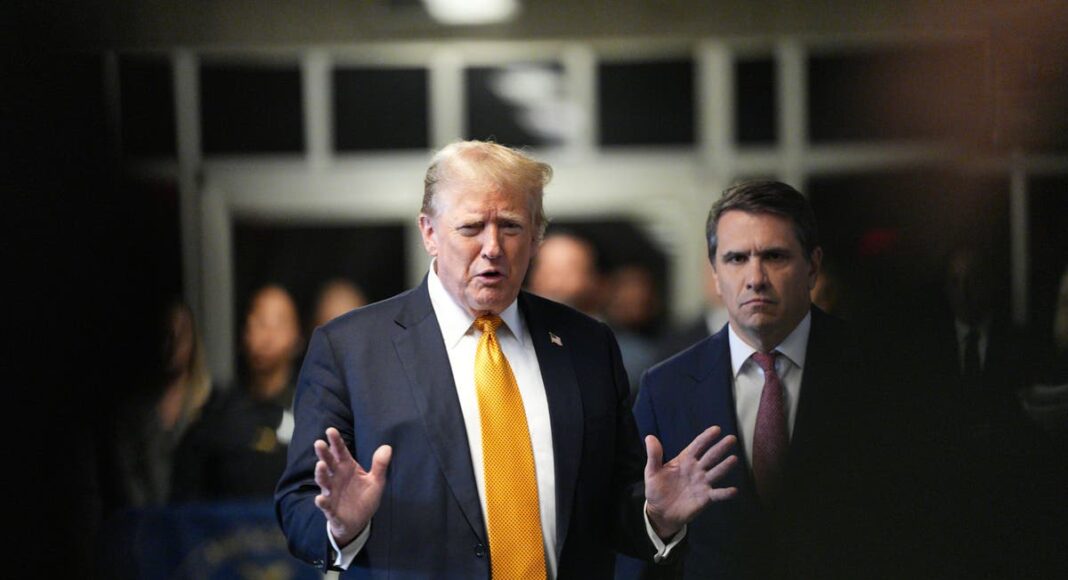Sign up for the daily Inside Washington email for exclusive US coverage and analysis sent to your inboxGet our free Inside Washington email
A jury of seven men and five women began deliberating the first-ever criminal case of an American president shortly before 11:30am on Wednesday.
Jurors must determine that Manhattan prosecutors have proved, beyond a reasonable doubt, that Donald Trump falsified business records with the intent to commit or conceal a conspiracy to unlawfully influence the 2016 presidential election.
Before their deliberations began, New York Justice Juan Merchan spent an hour instructing the jury on the laws governing the charges against the former president. Those instructions, largely adapted from dry statutory language, proe jurors with a crucial roadmap for understanding the eence and determining Mr Trump’s guilt.
He explained the definitions of key terms and phrases like “intent” and “proof beyond a reasonable doubt” and walked jurors through each of the 34 counts against the former president, including how each of those counts relate to documents shown in eence to jurors.
The judge reminded jurors that they alone are responsible for weighing the eence and testimony, and that their verdict must not be based on speculation, prejudice, sympathy, or an attempt to quickly avoid an “unpleasant duty” after six weeks of sitting in the courthouse.
The former president is charged with 34 counts of falsifying business records to cover up reimbursement payments to his attorney Michael Cohen, who testified that his former boss directed him to make a $130,000 hush money payment to Stormy Daniels to stop her from speaking publicly about having sex with Mr Trump.
He has pleaded not guilty.
The Russian nesting doll of crimes and cover-ups alleged in the case
Under New York law, a misdemeanor charge of falsifying business records is stepped up to a felony if tied to another crime.
To find him guilty, jurors must determine that Mr Trump not only had a hand in falsifying records but did so in order to commit or conceal another crime – specifically, that he violated state law against conspiracy to influence an election by “unlawful means.”
Those “unlawful means” include violations of the Federal Election Campaign Act, the falsification of other business records, and violations of state and federal tax laws.
Donald Trumps speaks to reporters in a criminal courthouse in Manhattan on May 29. ()
Prosecutors have alleged that Mr Trump’s hush money arrangements with National Enquirer publisher Da Pecker amounted to unlawful campaign contributions, made for the purpose of influencing an election.
For those other falsifications, Judge Merchan is allowing jurors to consider Cohen’s bank records that set up shell companies to wire hush money, records of that wire transfer, and 1099 tax forms that Mr Trump issued to Cohen.
Merchan also instructed jurors that it is unlawful to knowingly supply or submit materially false information to tax authorities, even if it does not result in the underpaying of taxes.
A verdict must be unanimous
All 12 jurors must be unanimous in delivering a guilty or not guilty verdict.
In order to find him guilty, the jury must agree that Mr Trump “personally, or by acting in concert with another person or persons, made or caused a false entry in the business records of an enterprise” and that he did so “with intent to defraud that included an intent to commit another crime or to aid or conceal the commission thereof. “
But they do not have to unanimously agree to what those “unlawful means” are.
And Trump did not object to unanimity over those ‘unlawful means’
Last week, Mr Trump’s attorneys agreed that juror unanimity is not typically required when it comes to unlawful means.
And they haven’t disputed that since.
A courtroom sketch depicts Justice Juan Merchan instructing jurors on May 29 while Donald Trump and attorney Todd Blanche watch from the defense table. (REUTERS)
Cohen is an ‘accomplice’
Mr Trump’s one-time “fixer” is an “accomplice” under New York law, Judge Merchan noted.
Even if jurors find Cohen’s testimony to be believable, they may not convict Mr Trump solely on Cohen’s testimony – unless it’s corroborated by other eence.
Jurors will remain in court
The jurors and a handful of alternates will remain at the courthouse – with a laptop that includes all eence from the case – through their deliberations, until they’re excused in the late afternoon. Lunch is proed, their phones are handed over to court officers, and they can only deliberate if they’re all together.
Juror 1 serves as the jury foreperson, who will offer up notes to the court, including questions to the judge and an announcement of a verdict. The foreperson will also deliver the verdict.
If a juror wishes to speak with the judge, he may respond by speaking to the entire jury to ensure that each and every juror is there at the exact same time, and so that jurors aren’t hearing word from the judge from other jurors.
This story was first published on May 29 and updated with developments




